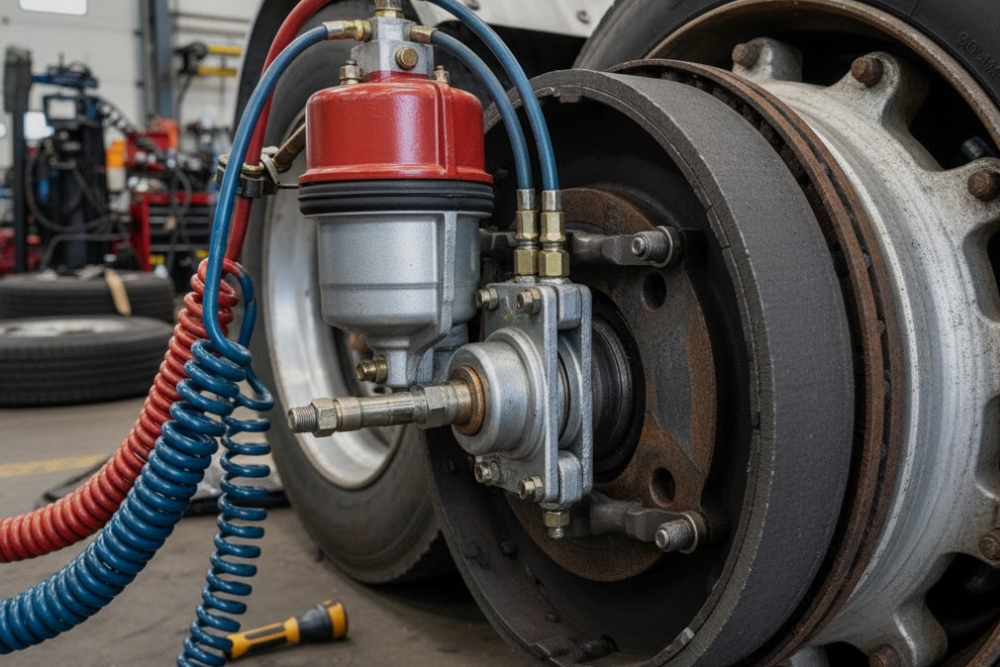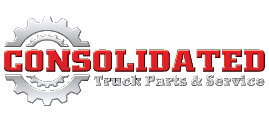Every mile counts for truck drivers in Monroe, LA, and nothing drains time and money faster than brake problems. Semi-truck air brake systems are built to handle the demands of heavy loads and long hauls, but even the strongest components wear down over time. Small issues like leaks, faulty valves, or neglected maintenance can quickly grow into major failures that lead to roadside breakdowns, costly repairs, or failed DOT inspections.
That is why Consolidated Truck Parts & Service created this guide. It is designed to help drivers and fleet managers understand how air brakes work, recognize early warning signs, and take preventative steps that save money over the long run.

We will cover the most common problems, explain the science of air brakes, share maintenance practices you can start today, and show why professional service is the safest investment for your truck. From routine safety checks to complete heavy-duty brake repair, you will learn how to keep your truck reliable, compliant, and profitable mile after mile.
Why Air Brake Systems Are Vital for Semi-Trucks
Air brakes are different from the hydraulic brakes on passenger vehicles. They use compressed air, not brake fluid, to transfer force. This system is designed for heavy loads, longer stopping distances, and repeated braking cycles. But that strength comes with complexity:
- A single leak can reduce air pressure and compromise stopping power.
- Moisture buildup in lines can corrode parts or freeze in cold weather.
- Components must work together with exact timing to deliver balanced braking.
The stakes are higher with semi-trucks. If a brake system fails, it can mean more than just an expensive tow. It can jeopardize lives. That is why heavy-duty brake repair and consistent inspections are essential.
Common Air Brake Problems in Semi-Trucks
Below is a breakdown of the most frequent issues our technicians see at the Monroe shop.
| Problem | Warning Signs | Prevention / Maintenance |
|---|---|---|
| Air leaks | Hissing sounds, frequent compressor cycling, low PSI | Inspect hoses, fittings, and tanks; perform leak-down tests |
| Moisture / contamination | Sluggish brakes, frozen lines, rust near tanks | Drain tanks daily, service air dryers, replace filters |
| Worn shoes & drums | Squealing, reduced braking power, uneven wear | Measure linings, replace parts before legal minimums |
| Faulty valves / compressor | Uneven braking, slow air build-up, warning lights | Inspect valves, test compressors, follow service intervals |
| Brake fade / overheating | Burning smell, weak braking on long stops, discoloration | Use engine brakes, inspect adjustments, schedule PM checks |
This simple table shows how most air brake problems reveal themselves long before complete failure. Recognizing early warning signs can save thousands in emergency repair costs.
The Science of Air Brakes: Why They’re Different From Car Brakes
Semi-truck brakes use a triple-safety design:
- Service brakes – for normal stopping.
- Parking brakes – spring-applied, air-released brakes that hold trucks when parked.
- Emergency brakes – automatically apply if air pressure drops too low.
This layered design is one reason air brakes are favored for heavy-duty vehicles. But it also means there are more parts, such as valves, chambers, compressors, and adjusters that can wear or fail.
Car brakes may squeal when pads get low, but semi-truck air brakes often give multiple smaller warnings like hissing, sluggish response, or low air pressure. Ignoring those signals can escalate into complete failure. Understanding these differences helps drivers take smaller issues more seriously.
Detailed Look at the Top Air Brake Problems
1. Air Leaks: The Silent Threat
Leaks are the number one issue for truck brakes. Even minor leaks cause compressors to run nonstop, creating wear and risking total pressure loss.
- Symptoms: Hissing at connections, PSI dropping too fast, constant compressor activity.
- Prevention: Leak-down tests, hose/fitting inspections, early replacement of worn seals.
2. Moisture and Contamination
Louisiana’s humidity makes moisture a common culprit in Monroe. Left unchecked, it mixes with oil and dirt, clogging valves and freezing in colder temps.
- Symptoms: Rust near tanks, sluggish response, frozen lines.
- Prevention: Drain air tanks daily, check dryer performance, replace filters, and desiccants.
3. Worn Shoes and Drums
Friction materials wear down over time, reducing braking effectiveness and risking DOT violations.
- Symptoms: Grinding noises, reduced stopping power, uneven tire wear.
- Prevention: Regular thickness checks, timely replacements, and using quality OE parts.
4. Faulty Valves and Compressors
If valves stick or compressors weaken, the entire air supply suffers.
- Symptoms: Uneven braking, slow build-up of air pressure, dash warnings.
- Prevention: Test valves regularly, maintain compressors, and service according to manufacturer specs.
5. Overheating and Brake Fade
Steep grades, stop-and-go traffic, or heavy loads cause brakes to overheat. The result? Brakes fade, where performance weakens under pressure.
- Symptoms: Burning smell, weak response, discolored drums.
- Prevention: Use engine brakes, adjust brakes properly, and schedule maintenance after heavy hauls.
The Ripple Effect of Neglecting Brake Maintenance
Brake problems don’t just affect stopping power. They impact:
- Safety: Increased accident risk.
- Compliance: Failed DOT inspections.
- Profitability: Emergency roadside repairs and downtime.
- Reputation: Missed deliveries damage customer trust.
When you invest in truck brake maintenance in Monroe, you’re not just fixing a truck—you’re protecting your business.
Preventative Maintenance Best Practices
Preventative maintenance is the most reliable way to avoid costly downtime. At Consolidated, we recommend:
- Daily pre-trip checks: Monitor PSI, listen for leaks, and confirm gauge readings.
- Weekly inspections: Drain tanks, test slack adjusters, check valve response.
- Quarterly PMs: Full DOT brake inspections, dryer service, brake lining checks.
This proactive approach extends brake life and reduces repair costs long term.
Why Choose Consolidated Truck Parts & Service in Monroe, LA?
Choosing the right partner for semi-truck air brake repair in Monroe, LA makes all the difference. Air brake systems are too critical to trust to just any shop, and Consolidated has earned the confidence of drivers and fleets statewide for decades.
- Generations of expertise – Serving Louisiana drivers since 1957 with a family tradition of quality and reliability.
- Certified brake technicians – Skilled in Class 8 systems, DOT compliance, and advanced safety standards.
- Advanced diagnostics – OE-level software and tools for precise troubleshooting and faster turnaround.
- 24/7 emergency service – Because breakdowns don’t follow a 9-to-5 schedule, and neither do we.
- Complete inventory – Stocking everything from shoes and drums to compressors, valves, and other critical brake parts.
- Transparent communication – You’ll receive regular updates, clear approvals, and honest pricing every step of the way.
With multiple locations across Louisiana, we’re more than a repair shop. We’re a long-term partner committed to keeping your trucks safe, compliant, and profitable on the road. Explore more about our services on our Brake Repair page.
Frequently Asked Questions
What are the common faults of an air brake system?
The common faults of an air brake system include air leaks, moisture buildup, worn brake shoes or drums, faulty valves, and weak compressors. These problems reduce braking efficiency and increase stopping distances. Regular truck brake maintenance helps prevent most of these issues before they cause downtime.
What does a hissing sound from my truck brakes mean?
A hissing sound from truck brakes usually indicates an air leak in hoses, fittings, or valves. Even small leaks lower system pressure and make the compressor work harder. Ignoring this warning can lead to unsafe braking performance and costly repairs if left unaddressed.
Why do my semi-truck air brakes feel soft?
Semi-truck air brakes feel soft when there is air loss, worn friction materials, or poor adjustment in the system. Soft brakes often mean reduced stopping power, which can be dangerous under load. Prompt inspections and heavy-duty brake repair restore proper braking response.
How often should I check my semi-truck’s brakes?
You should check your semi-truck’s brakes daily during pre-trip inspections and have them thoroughly inspected during every preventative maintenance service. The DOT also requires frequent brake checks to ensure compliance and road safety. Consistent inspections reduce failures and extend brake life.
Why are air brakes better for trucks?
Air brakes are better for trucks because they provide stronger stopping power, safety backups in case of pressure loss, and the durability needed for heavy loads. Unlike hydraulic brakes, air brakes don’t run out of fluid, making them more reliable for long-haul and heavy-duty applications.
Schedule Semi-Truck Air Brake Repair in Monroe, LA
Air brake safety is not optional. It is essential. At Consolidated Truck Parts & Service in Monroe, LA, we provide complete brake inspections, preventative care, and expert repairs that protect both your safety and your bottom line.
Visit us at 2604 Millhaven Road, Monroe, LA 71203, call (318) 325-1948, or schedule your appointment online.
Need service elsewhere? We also serve:
- Many – 1000 Fisher Road, Many, LA 71449 | (318) 256-9683
- Alexandria – 3333 North Bolton Avenue, Alexandria, LA 71303 | (318) 767-4287
- Lafayette – 2623 SE Evangeline Thruway, Lafayette, LA 70508 | (337) 467-0936
Stay ahead of brake issues and keep your truck compliant, safe, and profitable with Consolidated Truck Parts & Service.
